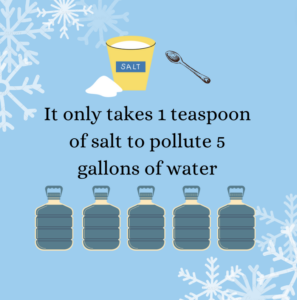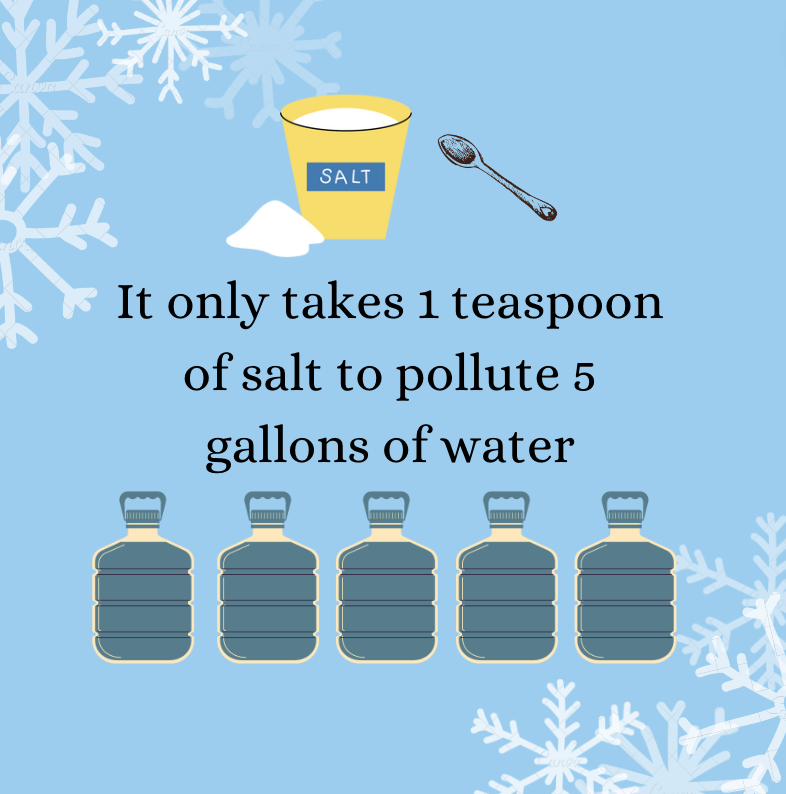Wisconsin's winters are no joke, and neither is the large amount of rock salt put down each winter season.
In fact, according to Allison Madison, the program director of Wisconsin Salt Wise, the amount of salt entering the lakes, streams and drinking water of Dane County increases every year.
It only takes one teaspoon of salt to pollute five gallons of water, and Dane County has used a lot of salt: 33,417 tons of it last winter, to be exact. Over the last few years, the county and its residents have started to see road salt as exceedingly important, especially as it correlates to water pollution. This increased awareness has led to more advocacy for the issue at hand, as well as new and updated initiatives to help mitigate salt use, at both a local and national level.
Salt doesn’t simply go away once introduced to the environment. Instead, it finds its way into the lakes, rivers, streams and wetlands, as well as the surface water and groundwater in the area. These waterways and water resources are then put at risk by the chloride and salinization connected to salt, which, respectively, can degrade freshwater ecosystems and threaten the quality of drinking water.
Last December, the City of Madison updated its salt use ordinance to account for excessive amounts of salt, according to Matthew Tucker, the director of the Building Inspection Division for the City of Madison.
There have been 107 cases reported since the ordinance went into effect, but so far no tickets have been issued. Cases get created when people report a problem or instance of over-salting to the city, which then sends out an inspector.
“What they’re looking for is that there has been an excess amount of residue or remaining salt on the public sidewalk after the melting agent has done its job,” Tucker said.
If there are clear signs of excess salt, the city will send a notice of violation with a set deadline for cleanup.
City ordinances aside, the Forest Products Laboratory took it upon itself to cut back on salt use in the winter of 2020. This initiative began after Robert Ramos, the facility operations specialist, recommended to his colleagues that they take a Salt Wise class, a course meant to teach people how much salt is the right amount of salt and the benefits associated with using this decreased amount.
Keven Kramer, a facility engineer at the laboratory, shared that its goal is to eliminate salt use completely.
“We’ve actually reduced our salt up to 75%, and my goal this year or next year is to be totally salt free,” Kramer said.
The laboratory has achieved this decrease by using brine, a water and salt solution, instead of rock salt.
“We put it down a day or two ahead of a [snow] event. It prevents the bond between the snow and the pavement, so snow removal is easier,” Kramer said.
By reducing or eliminating the use of salt as a de-icing agent, the laboratory can then reduce its salt contribution to Madison sewer system and waterways. So far, it has been able to reduce the total amount of salt entering the sewer system by an estimated 11,745 pounds per year.
Still, people can contribute to salt decreases on an individual level.
“For residents, it’s [about] getting out and shoveling more and salting less,” Madison said. “Shovel early and often to the formation of ice.”
People looking to learn more can also attend a Salt Wise class, such as Ramos and Kramer did.
“I took this class, and it was an eye-opener,” Kramer said.
“When I go out in the winter, that’s the first thing I notice when I park my car and go into a store,” said Ramos. “The first thing that grabs me is, ‘Wow, look at all the salt they’re putting down.’”
In 2021 Salt Wise hosted the first-ever Wisconsin Salt Awareness week. It has since been hosted every year, but the issue of road salt pollution extends beyond Dane County.
“Now we have partners in states across the country that want to participate and support this in 2024,” Madison said. “So, in 2024, it’s not going to be Wisconsin Salt Awareness Week. It’s actually going to be Winter Salt Awareness Week, and it’s going to be national.”
Perhaps without even meaning to, something that started in Dane County only a few short years ago will be used to educate the nation.
Wisconsin’s winters may be rough, but they always come to an end. Yet while winter comes and goes, the water polluted by rock salt remains. Whether it be at a county, city, company or citizen level, it is important to minimize salt use before the waterways and drinking water become overly polluted. That is why these local initiatives and the Salt Wise program are imperative to ensuring Dane County water stays clean, safe and healthy.
Winter Salt Awareness Week is Jan. 22-26, 2024. Learn more at https://www.wisaltwise.com/Take-Action/Salt-Awareness-Week.






